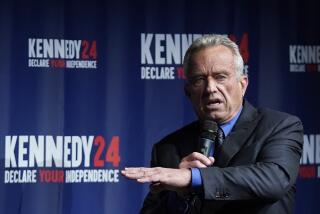Libertarians’ Presidential Choice : Politics: Nominee’s platform calls for repeal of income tax and abolishment of IRS. O.C. lecturer fails in bid to be first black man to head a national ticket.
CHICAGO — The Libertarian Party on Saturday picked a Las Vegas real estate agent and former state representative from Alaska as its 1992 presidential candidate.
Andre Marrou, 52, who was the party’s vice presidential candidate in 1988, said he will campaign on a promise to repeal the federal income tax and abolish the Internal Revenue Service.
Marrou was selected on a 257-155 vote over Richard B. Boddie, a Huntington Beach, Calif., motivational speaker and college professor.
If Boddie had been selected, he would have been the first black man to head a national political party ticket.
After Marrou won the nomination, Boddie was in a five-way race for the second spot on the ticket and narrowly won a majority of votes cast by delegates. However, he failed to receive the 221 votes required for nomination on the first round of balloting. Voting was scheduled to resume today.
More than 400 delegates attended the nominating convention for the party, which opposes taxes, government interference in the economy and regulations that curb personal freedoms.
If the income tax were repealed, government spending would have to be cut by 37%, Marrou said. He maintained that he could achieve the cuts in four years as President through attrition alone.
But if he were elected President, Marrou said, he would push for additional cuts in such programs as foreign aid, federal subsidies and the armed forces, which he maintains should be used only for defending Americans.
He said government has only three legitimate purposes--national defense, the court system and police.
“And even some of those might be privatizable,” he said.
In addition, Marrou, echoing the party platform, urged abolishing laws against so-called victimless crimes such as drug use and prostitution, and he called for an end to the ban on ownership of weapons such as machine guns.
“We’re the only party that protects your right to do what you want with your time, your money and your body,” he said.
While acknowledging that he would be unlikely to win the 5% of the vote in the general election needed to qualify for matching funds, Marrou maintained: “We are building a national party. . . . We will elect Libertarians to Congress. It’s just a matter of when and where.”
In 1988, the year Marrou was the vice presidential candidate, the ticket received less than 0.5% of the vote.
Contending that the party could win the presidency or congressional seats in 10 to 20 years if it begins making better use of television, Marrou said: “The Republican Party in 1860 (when Abraham Lincoln was elected President) is roughly where the Libertarian Party is now.”
The highest office a Libertarian candidate has ever held is state representative, although no party members now hold the office. Seventy-five Libertarians now hold lesser public offices across the country, he said.
Boddie, a part-time law and sociology professor at La Verne University, took his “Let’s Make History” presidential bid to 30 states. Part of his crusade, he said, was to bring national attention to the party and to destroy what he called the myths about the party, including the perception that it is is dominated by white, middle-class males.
After losing the presidential vote, Boddie stood at the podium with Marrou and thanked his supporters “who participated in this historic effort for our party, for our beliefs, for our efforts.”
The party is on the ballot in 26 states and hopes to be represented in all 50 for the presidential election, a spokesman said.
Although the party faces an uphill battle, the convention is receiving national television coverage for the first time this year. C-SPAN, a national cable public affairs network, is televising the convention.
Times staff writer Gebe Martinez in Orange County contributed to this story.
More to Read
Get the L.A. Times Politics newsletter
Deeply reported insights into legislation, politics and policy from Sacramento, Washington and beyond. In your inbox three times per week.
You may occasionally receive promotional content from the Los Angeles Times.









